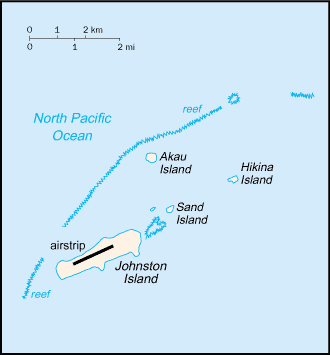


| The World Factbook | ||


|
Johnston Atoll |

|

|
| Introduction | Johnston Atoll |
|
Background:
|
Both the US and the Kingdom of Hawaii annexed Johnston Atoll in 1858, but it was the US that mined the guano deposits until the late 1880s. Johnston and Sand Islands were designated wildlife refuges in 1926. The US Navy took over the atoll in 1934, and subsequently the US Air Force assumed control in 1948. The site was used for high-altitude nuclear tests in the 1950s and 1960s, and until late in 2000 the atoll was maintained as a storage and disposal site for chemical weapons. Munitions destruction is now complete. Cleanup and closure of the facility was completed in 2004. |
| Geography | Johnston Atoll |
|
Location:
|
Oceania, atoll in the North Pacific Ocean 717 nm (1328 km) southwest of Honolulu, Hawaii, about one-third of the way from Hawaii to the Marshall Islands |
|
Geographic coordinates:
|
16 45 N, 169 31 W |
|
Map references:
|
Oceania |
|
Area:
|
total: 2.8 sq km
land: 2.8 sq km water: 0 sq km |
|
Area - comparative:
|
about 4.7 times the size of The Mall in Washington, DC |
|
Land boundaries:
|
0 km |
|
Coastline:
|
34 km |
|
Maritime claims:
|
territorial sea: 12 nm
exclusive economic zone: 200 nm |
|
Climate:
|
tropical, but generally dry; consistent northeast trade winds with little seasonal temperature variation |
|
Terrain:
|
mostly flat |
|
Elevation extremes:
|
lowest point: Pacific Ocean 0 m
highest point: Summit Peak 5 m |
|
Natural resources:
|
guano deposits worked until depletion about 1890, terrestrial and aquatic wildlife |
|
Land use:
|
arable land: 0%
permanent crops: 0% other: 100% (2001) |
|
Irrigated land:
|
0 sq km (1998 est.) |
|
Natural hazards:
|
NA |
|
Environment - current issues:
|
no natural fresh water resources |
|
Geography - note:
|
strategic location in the North Pacific Ocean; Johnston Island and Sand Island are natural islands, which have been expanded by coral dredging; North Island (Akau) and East Island (Hikina) are manmade islands formed from coral dredging; the egg-shaped reef is 34 km in circumference; closed to the public; a former US nuclear weapons test site; site of now-closed Johnston Atoll Chemical Agent Disposal System (JACADS); most facilities dismantled and cleanup complete in 2004; some low-growing vegetation |
| People | Johnston Atoll |
|
Population:
|
361 no indigenous inhabitants
note: in previous years, there was an average of 1,100 US military and civilian contractor personnel present; as of September 2001, population had decreased significantly when US Army Chemical Activity Pacific (USACAP) departed; as of January 2004 the island population was just above 200 personnel, including US Air Force, US Fish and Wildlife Service, and civilian contractor personnel (July 2005 est.) |
| Government | Johnston Atoll |
|
Country name:
|
conventional long form: none
conventional short form: Johnston Atoll |
|
Dependency status:
|
unincorporated territory of the US; administered from Honolulu, HI, by Pacific Air Forces, Hickam Air Force Base, and the Fish and Wildlife Service of the US Department of the Interior as part of the National Wildlife Refuge system |
|
Legal system:
|
the laws of the US, where applicable, apply |
|
Flag description:
|
the flag of the US is used |
| Economy | Johnston Atoll |
|
Economy - overview:
|
Economic activity is limited to providing services to US military personnel and contractors located on the island. All food and manufactured goods must be imported. |
| Communications | Johnston Atoll |
|
Telephone system:
|
general assessment: NA
domestic: 512 KB satellite link to Hawaii teleport; 20 (POTS) voice and data lines international: NA (2002) |
|
Internet Service Providers (ISPs):
|
1 256 KB circuit to US Department of Defense-run Nonsecure Internet Protocol Router Network (NIPRNET) (2002) |
| Transportation | Johnston Atoll |
|
Ports and harbors:
|
Johnston Island |
|
Airports:
|
1 (2004 est.) |
|
Airports - with paved runways:
|
total: 1
2,438 to 3,047 m: 1 (2004 est.) |
| Military | Johnston Atoll |
|
Military - note:
|
defense is the responsibility of the US |
| Transnational Issues | Johnston Atoll |
|
Disputes - international:
|
none |
|
This page was last updated on 20 September, 2005 |